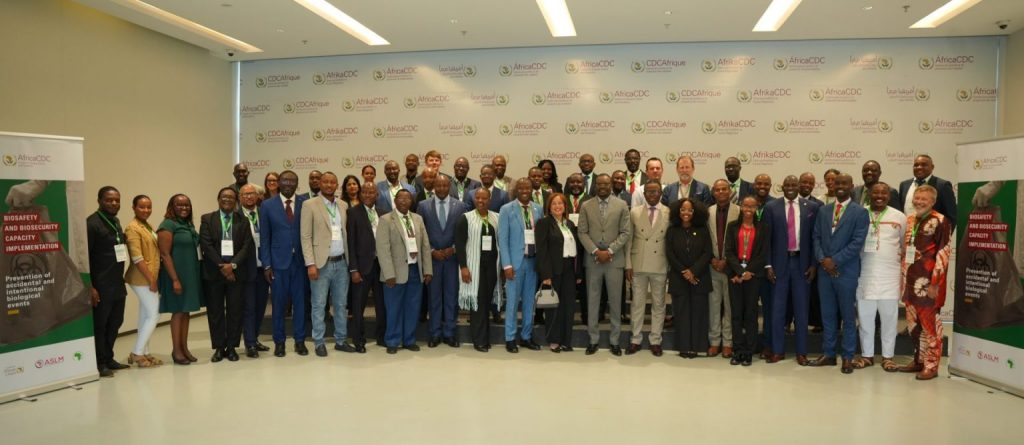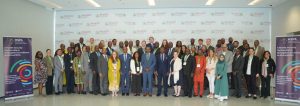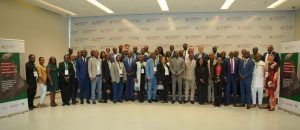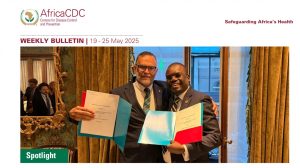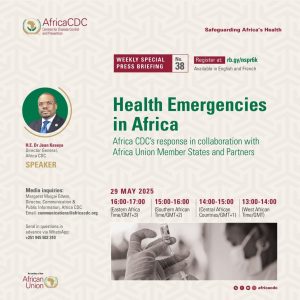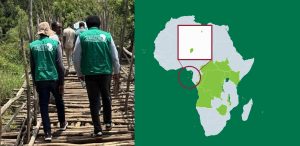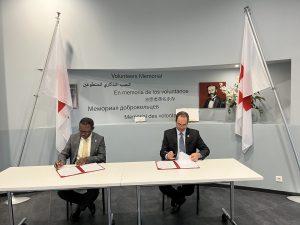Addis Ababa, Ethiopia | 28 May 2025 — The Africa Centres for Disease Control and Prevention (Africa CDC), in collaboration with the African Society for Laboratory Medicine (ASLM), has completed a five-year review of its Biosafety and Biosecurity Initiative (BBI). The review paves the way for a new continental strategy to strengthen Africa’s preparedness and response to accidental and deliberate biological threats to health, security, and economic stability.
The BBI has been made possible through the support of Canada’s Weapons Threat Reduction Program, the World Bank, and African Union Member States. The BBI is fully aligned with the objectives of the G7-led Global Partnership Against the Spread of Weapons and Materials of Mass Destruction (GP) and the associated Signature Initiative to Mitigate Biological Threats in Africa (SIMBA). In partnership with Africa CDC, ASLM and other African partners, SIMBA aims to bolster health security and non-proliferation efforts across the continent by strengthening capacities to prevent, detect, and respond to biological threats.
Representatives from African Union Member States, chairs of the five Regional BSBS Technical Working Groups, delegates from three regional Centres of Excellence, the Examination and Certification Committee, and regional institutions, including the World Health Organization (WHO), the West African Health Organization (WAHO), the World Organisation for Animal Health (WOAH), Global Partnership members, and BSBS partners, convened to identify priorities for the upcoming 2025–2030 strategy.
“As we conclude the first phase of the strategy, it is critical to reflect on the gains made, identify the gaps, and chart a forward-looking path for the second phase,” said Dr Raji Tajudeen, Acting Deputy Director General and Head of the Division of Public Health Institutes and Research at Africa CDC. “When a single biological incident, whether accidental or deliberate, can affect multiple countries in a matter of days, the necessity for a continent-wide, harmonised biosafety and biosecurity framework becomes undeniable.”
The new strategy will focus on raising regional awareness of biosafety and biosecurity, while supporting the establishment of National BSBS Technical Working Groups and Associations to drive local implementation and institutionalisation. It also prioritises the development of a sustainable funding framework to help Member States transition from external dependence to domestic resource mobilisation and aims to strengthen multi-stakeholder engagement to enhance the effectiveness and reach of biosafety and biosecurity interventions across the continent.
Africa CDC conducted a series of consultative workshops to assess the status of biosafety and biosecurity implementation across the continent. These consultations helped identify capacity gaps and informed the development of a regional, Five-Year Strategic Plan (2021–2025). This plan was implemented with the support of key partners, including Global Affairs Canada’s Weapons Threat Reduction Program, the United States Centres for Disease Control and Prevention (US CDC), the United States Defense Threat Reduction Agency (DTRA), the Nuclear Threat Initiative (NTI), and the World Bank.
Some thematic areas will continue to guide Africa CDC’s biosafety and biosecurity agenda. These include strengthening national legal and regulatory frameworks, building capacity for laboratory biosafety and pathogen control, and promoting secure and ethical research and development practices.
ASLM has made biosafety and biosecurity systems a core component of its projects, establishing itself as a cornerstone of Africa’s health security architecture.
“Sustained investment in BSBS remains imperative to safeguard Africa against both natural and man-made biological threats,” said Mr Nqobile Ndlovu, Chief Executive Officer of ASLM. “We need deeper ownership and institutionalisation of the critical capacities built over the past five years.”
“Global Affairs Canada is proud to support the Biosafety and Biosecurity Initiative as a key contribution to SIMBA,” said Trevor Smith, Deputy Director, Weapons Threat Reduction Program, Global Affairs Canada. “The SIMBA brings together the right partners at the right time to tackle a threat of global signficance.”
Over the past five years, the BSBS initiative has achieved significant milestones, including the establishment and operationalisation of five regional, multisectoral technical working groups; the development of an African Union-endorsed legal framework; and the creation of a certification and regulatory system for institutions handling High-Consequence Agents and Toxins.
“The lessons from recent disease outbreaks have shown us that risks are no longer isolated – a risk to one is a risk to all,” said His Excellency Mr Adam Drury, Ambassador of the United Kingdom and Deputy Permanent Representative to the African Union. “Strengthening biosafety and biosecurity is not just important; it is a global imperative. The United Kingdom remains committed to supporting the health agenda and building on the remarkable progress you have made over the past five years.”
###
AboutAfrica Centres for Disease Control and Prevention (Africa CDC)
The Africa Centres for Disease Control and Prevention (Africa CDC) is a public health agency of the African Union. It is autonomous and supports member states in strengthening health systems. It also helps improve disease surveillance, emergency response, and disease control. Learn more at: http://www.africacdc.org and connect with us on LinkedIn, Twitter, Facebook and YouTube
About ASLM:
The African Society for Laboratory Medicine (ASLM) is a pan-African organization dedicated to improving laboratory services and systems across the continent. ASLM works in partnership with governments, international organizations, and healthcare providers to enhance laboratory capacity and improve health outcomes. Learn more: www.aslm.org
About SIMBA
The Signature Initiative to Mitigate Biological Threats in Africa (SIMBA), a flagship effort of the 31 member, G7-led Global Partnership Against the Spread of Weapons and Materials of Mass Destruction, aims to reduce biological threats through the aligned activities of GP and African countries. Learn more https://www.gpwmd.com/signature-initiative-to-mitigate-bio-threats-in-africa and @GPWMDofficial
For more information and media inquiries:
Margaret Edwin | Director of Communication and Public Information | Africa CDC EdwinM@africacdc.org
Nelly Rwenji | Senior Brand and Communications Manager, ASLM | Email: NRwenji@aslm.org
Karoline Oberländer | Head of G7 GP SIMBA Cordination Unit Email: SIMBA-office@rki.de

